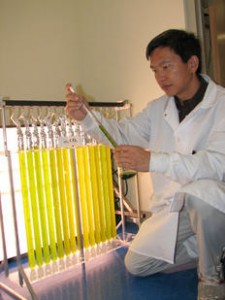Arizona State University through a $1 million grant from the U.S. Department of Agriculture (USDA) is studying the factors involved in algal crop failure known as culture “crashes.” Grazing zooplankton are considered predators to algae and can cause loss of productivity. According to scientist Qiang Hu and his research team, except for a few algal strains that can tolerate extreme growing environments, the hazard of predator contamination is so great that sustainable cultivation of many algal crops, in particular, oil-producing algal strains on a large-scale, has not been possible.
Hu is the co-director of the Arizona Center for Algal Technology and Innovation (AzCATI) / Laboratory for Algae Research and Biotechnology (LARB). He says that the cost of crop failures could be in the multi-million dollar range if zooplankton have their way. Zooplankton are microscopic animals that are often identified as amoebas, protozoans, ciliates and rotifers. All are predators on microscopic algae, which represent the base of the aquatic food chain.
 “Without a detailed understanding of the factors influencing the occurrence, population dynamics, impact and control of zooplankton, it could potentially prevent algae from being a practical source of oil crops for production of bioenergy and bioproducts,” says Hu.
“Without a detailed understanding of the factors influencing the occurrence, population dynamics, impact and control of zooplankton, it could potentially prevent algae from being a practical source of oil crops for production of bioenergy and bioproducts,” says Hu.
The team is just getting started in its study and they plan to survey zooplankton contamination in commercial algal production systems, as well as in their own algae testbed facilities located at ASU Polytechnic campus. Simultaneously, the team will determine living and non-living influencers on zooplankton, with the goal of developing an empirical model for assessment and prediction of potential impact of zooplankton contamination on overall algal culture stability and biomass production potential.
The team will use state-of-the-art bio-imaging and DNA fingerprinting techniques to help them develop a rapid, sensitive monitoring and an early warning system. At the same time, they will evaluate several innovative control measures, and ultimately develop a Best Management Practices Plan (BMPP) for prevention and treatment.
“The comprehensive BMPP will be the key to achieve sustainable production of algal feedstock, and thus enable successful commercialization of algae-based biofuels and bioproducts,” explains Hu.
“Results from the research plan to be shared widely with the biotechnology community and the algal biofuels industry, through publications and conference presentations, as well as workshops and training courses provided by LARB and AzCATI.

